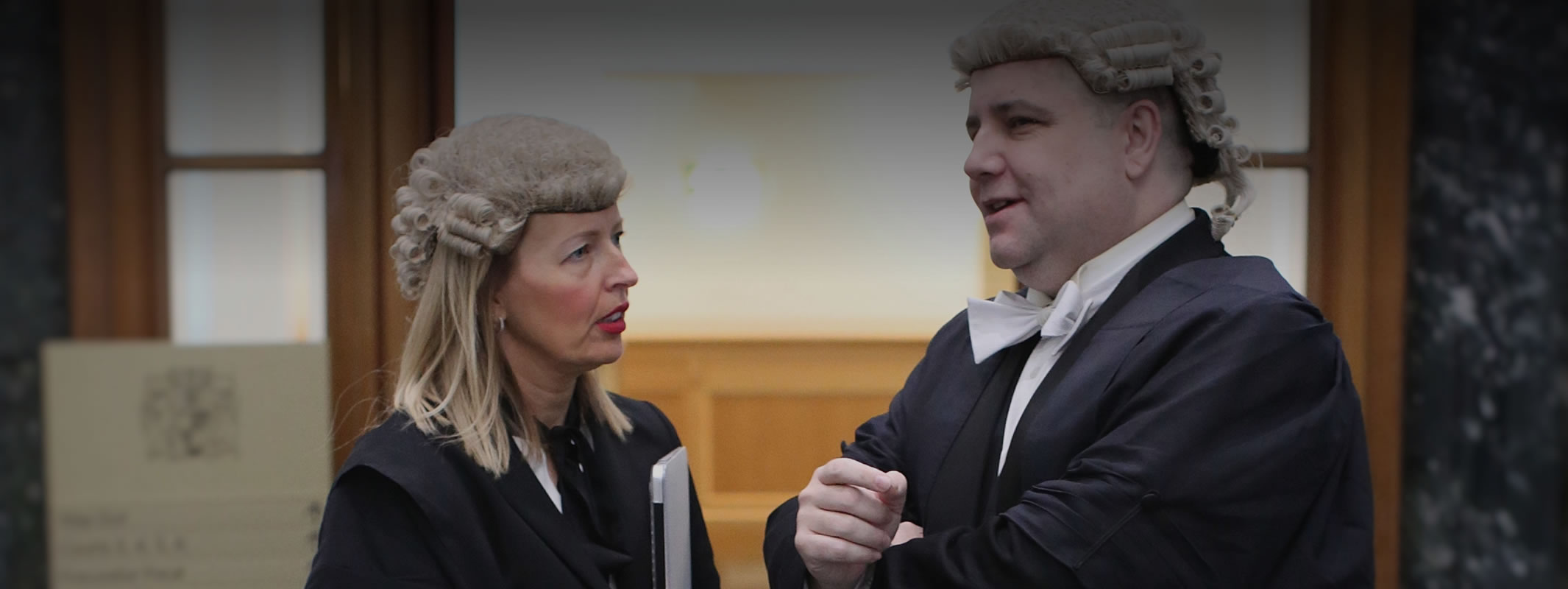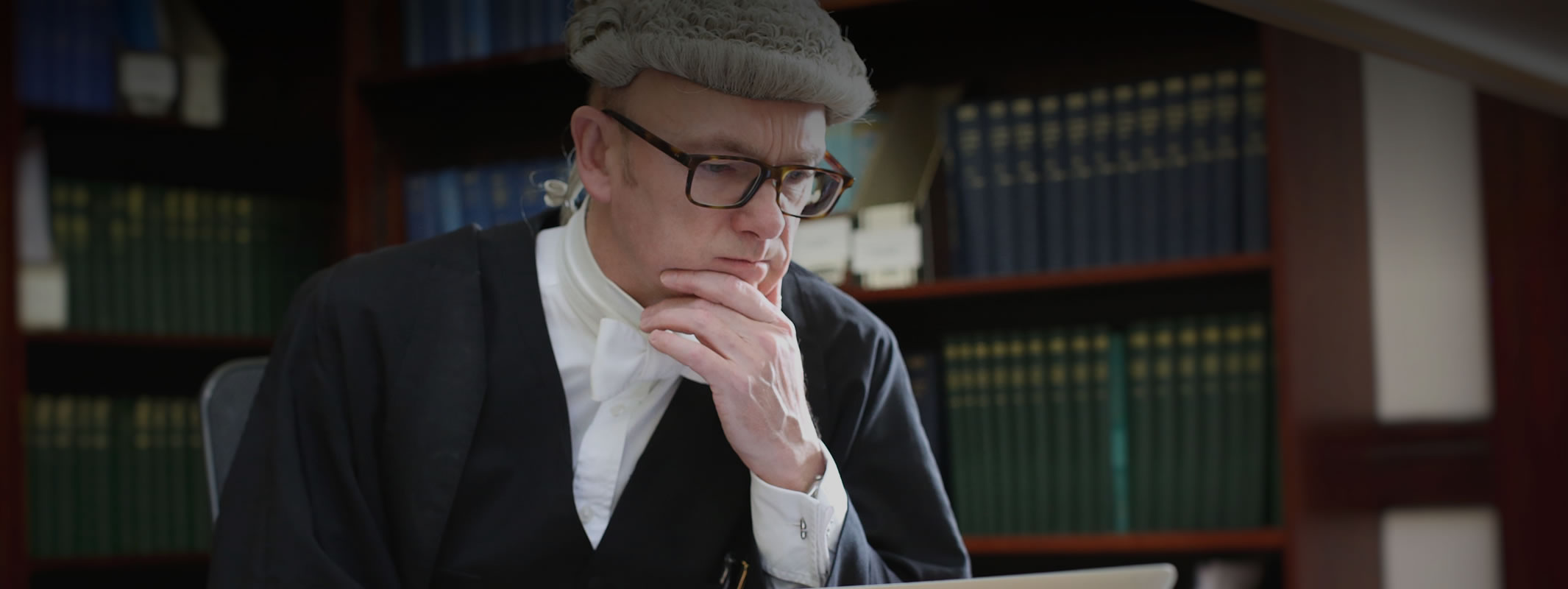In the new intake for 2024 we had four Devils join us:- Mairi-Clare McMillan, Linzi McQuade, Martin Lennon and Iona Young.
In the new intake for 2023 we had 1 devil join us:- Deirdre Flanigan.
Gareth Reid joined us from Arnot Manderson in July 2023. We are looking forward to working with Gareth and are delighted to have him join us.
Charles Ferguson joined us from Black Chambers in January 2023. Charles is looking to further develop his West of Scotland practice. We are delighted to have him join us.
In the new intake for 2022 we had three devils join us:- James McCrone, Lynsey Morgan and Alistair Sloan.
In the new intake for 2021 we had three devils join us:- Patricia Baillie, Callum Hiller and Rosalyn McTaggart.
Kevin Henry joined us from Compass Chambers in July 2020. We are delighted to have Kevin on board and we are sure that this will have been a great move for him.
In the new intake for 2020 we had three devils join us:- Mark Lutton, Valentina Mori and Laura-Anne Radcliffe.
Colin Mackenzie retired from Faculty in April 2020. We wish Colin all the best for the future.
Laura Reilly retired from Faculty in December 2019. We hope that Laura enjoys this new chapter in her life.
Vincent Lunny resigned from Faculty in January 2019 in order to start a new legal career in New Zealand. We wish Vincent all the best for the future.
Frances Connor joined us from Black Chambers in January 2019. Frances joins us with a busy Criminal and Children’s referral practice. We are delighted to have Frances on board.
Richard Aird retired from Faculty in October 2018. We wish Richard all the best for the future.
Joe Barr re-joined the stable at the end of May 2017 after an extended absence following his cardiac arrest in 2012. We are delighted to welcome Joe back in the fold and are sure that he will pick up where he left off with his successful criminal practice.
Neil Murray QC joined us from Black Chambers in December 2016. Neil is looking to further develop his practice in Glasgow and throughout the country. We are sure his move will help him to do this. We are delighted to have him join us.
Vincent Lunny joined us from Westwater Advocates in November 2016. Vincent is based in Glasgow and felt it may be more beneficial to be in a Criminal Stable based in the West. We look forward to working with Vincent and developing his practice in the West.
Laura Reilly joined us from Black Chambers in February 2016. Laura is highly skilled in both Criminal and Family Law. We are sure this was a great move for Laura and look forward to working with her.
Niall McCluskey joined us in September 2015, coming to us from the Hastie Stable. Niall has extensive experience in various aspects of the Law. We are sure that this move will help him further develop his practice both in the West of Scotland and throughout the Country.
In the new intake for 2015 we had one devil join us:- Neil Shand.
In the new intake for 2014 we had two devils (pupils) join us:- Julian Aitken and Donna Armstrong.
Richard Aird joined us from the Murray Stable on the 8th October 2013. We believe Richard’s move will be advantageous in developing his practice here in the west as well as throughout the country in general. We are very happy to have him on board with us and are looking forward to working with him in order to achieve those aims.
James MacDonald came to us from Arnot Manderson Advocates on the 4th October 2013. James has a wealth of experience in both criminal and civil matters and we are delighted to have him on board.
Rosemary Guinnane joined us from the Black Chambers on 6th September 2013. Rosemary has a wealth of experience in both Criminal and Civil Law and we are delighted to have her on board.
Adam Ardrey joined us from the Murray Stable on 28th August 2013. We are looking forward to working with Adam and are sure that this will be a good move for him.
In the new intake for 2013 we had four devils (pupils) join us:- Greg Farrell, Wendy Hay, John McElroy and Safeena Rashid.
Sarah Livingstone came to us on 16th April 2013 having been with the Black Chambers since not long after she called to Bar in 1999. Sarah is based in Glasgow and her practice is mainly concentrated here in the City and in the West of Scotland. She decided that because of this she might gain more benefit from joining us here in Glasgow, which we are sure she will. We look forward to working closely with Sarah and assisting her in developing and progressing her practice here in Glasgow.
Derek Ogg QC joined us on 23rd November 2012 having been with the Black Chambers in Edinburgh for a number of years. Derek is recognised as one of the most senior criminal practitioners in the Country today. We are delighted to have him on board.
Dale Hughes joined us on 21st November 2012 from the Edinburgh based Connarty Stable. Dale practices mainly in Criminal Law and as such is of the view that he might better his practice with us here in Glasgow. We are sure that will prove to be the case and are very happy to him on board.
Shirley McKenna came to us on 19th November 2012. Shirley had been a member of the Connarty Stable in Edinburgh since 2005. Shirley is another of our members who lives in the city of Glasgow and has come to the conclusion that MacKinnon would be the natural home for her. We are very happy that she decided to join us and are sure that it will be a good move for her.
Edward Targowski QC came to us from the Edinburgh based Black Stable on 6th November 2012. He has decided that because we are active in Glasgow, our Stable will be a natural home for him. We are sure that this will be the case and look forward to helping him achieve his aim in further developing his practice throughout the Country. We are very happy to have him join our group of Advocates.
Lynsey Rodger joined the stable on 26th October 2012 having been a member of the Arnot Manderson stable in Edinburgh for a number of years. She has decided that Glasgow might offer her a better opportunity and is a natural base for her considering she now lives in the city. We are delighted to have her on board.
Bill Adam joined us from Connarty Advocates on 23rd April 2012. We are delighted to have him on board and we are sure that he will be able to develop his practice further here in the West.
We were delighted Louise Arrol joined us 19th December 2011. Louise came to us from the Black Chambers and has settled in very well considering Glasgow is her natural base with most of her instructing agents being situated here.
Neil Taylor moved on at the end of 2011. He has gone non-practising and become more involved in the Medical legal side of the profession working as a Consultant. We wish him well in all his future endeavours.
Briefing Paper on the Convention-compatibility of new pre-trial defence disclosure regime
Lewis Kennedy, Advocate.
Defence Statements under section 70A of the Criminal Procedure (Scotland) Act 1995:
Introduction:
Defence statements are now a statutory requirement in respect of solemn cases commenced after 6 June 2011[1], under section 70A in the Criminal Procedure (Scotland) Act 1995 (as inserted by section 124 of the Criminal Justice and Licensing (Scotland) Act 2010).
It is a matter of some concern that these provisions constitute an erosion of the common law adversarial system. In recent years, there has been a perceptible movement away from the traditional adversarial model towards a more inquisitorial form of trial – with the judicial micro-management of cases dressed up with the antiseptic label of ‘case management’. A culture has emerged subordinating procedure to substance. With this new regime, there is an increased risk that the judge might enter the arena too enthusiastically, acting as an advocate and second prosecutor – such that the impartial administration of justice might appear to be prejudiced.
In England, the correlating legislation could at least be said to have been directed towards assisting in the operation of a more sophisticated and regulated disclosure regime. Here, the equivalent legislation has no stated purpose. Certainly, there is no indication as to the rationale behind this legislation in the Explanatory Notes in the Criminal Justice and Licensing (Scotland) Act 2010.
This paper considers whether the requirement for an accused person to lodge a ‘defence statement’ is in breach of general fair hearing requirements (as guaranteed by Article 6(1), ECHR); the Convention right to ‘equality of arms’, in the regulation of respective disclosure requirements for the Crown and defence (under Article 6(1) and Article 6(3)(b)); the Convention right to a presumption of innocence, the right to silence and the privilege against self-incrimination (in terms of Article 6(2)); and the right to legal professional privilege in the conduct of an accused’s defence at trial (under Article 6(3)(c)).
If so, it could be argued that these newly enacted provisions are ultra vires – in so far that this legislation has exceeded the legislative competence of the Scottish Parliament – thereby precipitating a ‘Devolution Issue’ Minute.
The information required:
Section 70A(9) provides as follows:-
‘(9) In this section, “defence statement” means a statement setting out-
the nature of the accused’s defence, including any particular defences on which the accused intends to rely,
any matters of fact on which the accused takes issue with the prosecution and the reason for doing so,
particulars of the matters of fact on which the accused intends to rely for the purposes of the accused’s defence,
any point of law which the accused wishes to take and any authority on which the accused intends to rely for that purpose,
by reference to the accused’s defence, the nature of any information that the accused requires the prosecutor to disclose, and
the reasons why the accused considers that disclosure by the prosecutor of any such information is necessary.’
It can be seen that there is an obligation upon the defence to include a considerable degree of information – in particular, any matters of fact with which the accused takes issue in the prosecution case, and his reasons for doing so (paragraph (b)); and particulars of the matters of fact on which the accused intends to rely for the purposes of his defence (paragraph (c)).
Indeed, the defence must give notice of any issues, which may be in dispute – implying that the defence must subsequently obtain leave of the Court to argue issues, which have not previously been identified in the defence statement.
Depending on what is said in the defence statement, further disclosure of prosecution material, which is relevant to the stated defence, may be triggered.
The relevant form is prescribed by the Act of Adjournal (Criminal Procedure Rules Amendment No. 4) (Disclosure) 2011, which provides (7A.2.) that the ‘defence statement’ lodged under section 70A shall be in Form 7A.2-A. The form requires to be served upon the Crown and any co-accused.
The time limit for compliance is extremely short – the form must be lodged at least 14 days before the First Diet in Sheriff and Jury proceedings; and the Preliminary Hearing in High Court proceedings.
Unsurprisingly, the provisions do not impose any corresponding obligation upon the Crown. It is not as if the prosecution is required to supply a ‘case statement’ – or if the Court has been empowered with a discretion to order production of a case statement’ by the Crown.
Sanctions for non-compliance:
On the basis of the English experience, it would appear that it is not open to the defence lawyer to advise his client not to file a ‘defence statement’.
However, though the statutory obligation is mandatory, there do not appear to be any identified sanctions for non-compliance in terms of the Scottish legislative scheme.
Nonetheless, the very real risk is that an accused might be left open to cross-examination, and adverse comment from the Crown; a co-accused’s lawyer; and the trial Sheriff.
It is not immediately apparent from the wording of the Scottish statute that the Court might draw adverse inferences from non-compliance – but equally, this prospect is not expressly excluded. It would appear that on the basis of the relevant English interpretative case law, whether or not adverse comment is permitted is a matter for the Court’s discretion.
Failure to comply could even be regarded as an obstruction of justice and/or a Contempt of Court.
Meanwhile, an accused person could conceivably be prosecuted for making a false exculpatory ‘defence statement’. As a condition of defending himself the accused risks a perjury prosecution.
It is a matter of particular concern that the defence lawyer even could be found in Contempt of Court if he has failed, without reasonable excuse, to comply with this mandatory requirement.
The ‘errant’ or non-compliant lawyer could also be the subject of a disciplinary complaint to his regulatory body. Or to the Scottish Legal Aid Board (with the implied threat of de-registration and an ensuing loss of livelihood). [10] It is not know whether it is seriously being suggested that the Court is not just to try a case, but is to discipline parties for the conduct of their cases.
Possible aggravating factor in sentence:
Perhaps more practically, it is likely that the failure of the accused (or of his lawyer acting on his instructions) to comply would be regarded as an aggravating factor in sentencing in the event of conviction.
Notifying all elements of the offence as being in dispute would almost certainly be held against the accused. As would giving notice that all issues are in dispute, without identifying the particular issues in dispute. Or a failure to notify adequately the issues in dispute; or even by maintaining that some issues remains in dispute. Even the existence of a single outstanding disputed issue might subsequently test the patience of certain sentencers.
Download PDF
Lewis Kennedy, Advocate
We should always be wary of euphemistic language. We should remember to speak of the Police Office – and not the Police Station – because a Police Station is an intimidating and sinister venue. We used to deal with the Police Force – and not the Police Service. Equally, the solicitor is not participating in a mere ‘interview’ of his client. This is not some perfunctory business meeting – but a ‘custodial interrogation’ of a detainee (to apply the phraseology of the European Court) in a criminal trial process, which is necessarily adversarial in character. As such, these can be occasionally hostile and aggressive encounters.
So, what exactly is the difference between a police interview and a police interrogation? In one word: everything. An interview is a fact-gathering contact. An interrogation is what the police do when your client is their suspect and their purpose is to extract an incriminating statement from him, which can then be used to convict him.
To the detainee, the whole interaction with the police correlates to his first day of trial; and the laying of a criminal charge, which is akin to a preliminary determination of guilt. The investigative stage of the criminal process involves an intimidating environment with accusatory features. All steps taken during this stage have an impact on the suspect’s defence.
It should be remembered that the police are allowed to employ trickery, lies, and threats of certain kinds, promises and other forms of deception and psychological manipulation, in order to get suspects to waive their right to legal representation and to admit their crimes. In practice, the interrogation room is often imbued with an atmosphere of implied violence and physical coercion – none of which would be permitted in the courtroom context.
Each police officer understands the enormous difference between, on the one hand, a police-station interrogation of an unrepresented, unprepared and frightened suspect – and, on the other hand, the formal questioning of a ‘lawyered-up’, well-prepared suspect. In the eyes of the police, the latter is no substitute for the former. Cops want to solve crimes in real time. They want to find the body while it is still warm – or, even better, still alive. They understand that confessions offered under the pressure of police interrogation may be faulty, but the physical evidence to which they may lead will often be self-proving and crime solving.
Police investigators will thus have considerable incentives to interrogate vulnerable suspects, especially if they can use the fruits of such interrogations to do their crime-solving jobs – an entirely different remit from the prosecutor who can only seek conviction at trial with admissible evidence.
Accordingly, safeguarding suspects’ rights in a substantial and effective manner can demand real commitment from the defence solicitor.
The purpose of this paper is to address the following issues:
What exactly is the solicitor’s purpose in attending on his client in police custody; the limitations of providing only telephone advice; special considerations in respect of the vulnerable or mentally disturbed suspect; consideration of whether detainee waiver of the right to legal representation has been legitimate; the pre-conditions, which the solicitor should insist upon, particularly by way of pre-interview disclosure; whether the police should even be questioning the ‘chargeable suspect’; how the solicitor should deal with oppressive and objectionable police questioning or obstructive police conduct; whether absolute silence is truly the best policy; immunity; compulsory questioning under section 172 of the Road Traffic Act; the taking of forensic samples; whether the solicitor might even challenge a Search Warrant application, hitherto an exclusively ex parte affair, since any such hearing now coincides with his representation of his client; and how to deal with the refractory client who is determined to talk in defiance of legal advice.
Download PDF
Alice Whitefield v P.F. Portree [2012] HCJAC 70
Determination by the court on the forfeiture of a vehicle following a conviction for failing to provide a specimin of breath. The court held that forfeiture was excessive in the circumstances and the order was quashed.
www.scotcourts.gov.uk/opinions/2012HCJAC70.html
Hector MacLennan v HMA [2012] HCJAC 94
www.scotcourts.gov.uk/opinions/2012HCJAC94.html
Lewis Kennedy, Advocate
Article:
The polygraph and Luke Mitchell – gimmick or overlooked forensic tool?
Download PDF
March 8th – CPD (1 Hour) Seminar with SLAB – Criminal fees update
April 12th – CPD (2 Hours) Seminar by Digital Forensics Expert Jim Borwick – mobile telephone forensics
April 26th – CPD (2 hours) Family Law Seminar with speakers from the Stable – followed by Hospitality
May 24th – CPD (2 Hours) Seminar in Inverness with various speakers from the stable
June 28th – CPD (2 Hours) Seminar in relation to Criminal Law with various speakers from the stable for the Falkirk Faculty
September 6th – CPD (2 Hours) Seminar by The Forensic Institute
September 27th – CPD (2 Hours) Seminar by Dr Paul Skett and Dr Stephanie Sharp of Glasgow Expert Witness Service Ltd
November – Mackinnon Advocates Winter Reception
All CPD events will be accredited.
Glasgow events will take place in the Corinthian, Ingram Street, Glasgow. Registration is 16.30 hours, with the event commencing at 17.00 hours.
If you wish to attend any of these events please contact Angela Bath on 0141 370 8669 or angela.bath@advocates.org.uk.
Tony Graham, our Stable Director was appointed to the rank and dignity of Queens Counsel in September 2017. We are all delighted for Tony.
March 29th 2017 – CPD (2 Hours) – Beyond the Basics: Criminal Law Update with Mackinnon Advocates – in conjunction with the SYLA – 29 Private Members Club, Glasgow
April 13th 2017 – CPD (2 Hours) Seminar by Law Accountant Tim Atler “Leaving the Flat Rate Scheme for VAT, Making Tax Digital and how you can organise your accounts to deal with these changes”
May 4th 2017 – CPD (2 Hours) Seminar with Forensic Experts from Keith Borer – Adrian Armstrong “The causes of Road Traffic Collisions – a case study” (1 hour) and Simon Bunter “Cognitive Bias in Fingerprints: What do you think?” (1 Hour)
June 23rd 2017 – Mackinnon Advocates Summer Reception – The Corinthian, Ingram Street, Glasgow (Invite Only)
October 26th 2017 – CPD (2 Hours) Seminar by Computer Forensics Expert Jim Borwick – Mobile telephone forensics
November 16th 2017 – CPD (2 Hours) Seminar By Dr Rhonda Wheate – discussing the mounting international evidence of catastrophic failure across all parts of forensic science, and the things that the criminal bar and juries need to look out for in these circumstances.
All CPD events will be accredited.
Most events will take place in The Corinthian, Ingram Street, Glasgow. Seminars will commence at 17:00 with registration from 16:30.
If you would like to attend any of these events please contact Angela Bath on 0141 553 4892 or on the email address shown on the website
Frank Gallagher who was a member of our stable for some 26 years sadly passed away suddenly on 6th August 2016.
Although he had suffered with ill health for some time, his passing came far too soon and was a shock to us all. Frank was a real character and much loved and respected by those who knew him both on a personal and professional level. He will be very sorely missed by all of his friends and colleagues and others who had the priviledge to have met him and to know him.
JUNE 17th 2016 – Mackinnon Advocates Summer Reception – Bar Soba, 79 Albion Street, Mechant City, Glasgow
JULY 16th 2016 – CPD (4.5 Hours) Seminar on different aspects of Criminal Court Practice – Various speakers from the Stable – Dundee




